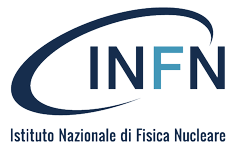Based in Povo, it will exploit the equipment and skills of existing research units in Trento. Some seventy researchers are directly involved in work at the new centre. Projects will address space research, supercomputing, biomedicine and photonics. The INFN, University, Kessler Foundation and ATreP have signed a declaration of intent to develop new activities at the centre.
Trento, 15 January 2013 – The Trento Institute for Fundamental Physics and Applications (TIFPA), the INFN’s new centre dedicated to particle physics and the development of cutting-edge technologies in sensoristics, space research, supercomputing and biomedicine, was inaugurated today in the Aula Magna at the Ferrari centre for science and technology of Trento University. The TIFPA stems from the collaboration between the Italian Institute for Nuclear Physics (INFN), the University of Trento, the Bruno Kessler Foundation (FBK) and the Trento Provincial Agency for Proton Therapy (ATreP).
The new centre will deal with research in fundamental physics as well as innovation and technology transfer, exploiting the existing infrastructures, skills and human resources of the project’s partners in Trento and expanding specific areas of action. It will, for instance, be able to count on the infrastructures of the Centre for Materials and Microsystems and of the European Centre for Theoretical Physics of the Bruno Kessler Foundation, and use the new proton therapy machine that will become operational by the end of 2013.
Speakers at the inauguration ceremony included representatives from the research organisations involved: Davide Bassi, Rector of the University of Trento, Fernando Ferroni, President of the INFN, Andrea Simoni, Secretary General of the Bruno Kessler Foundation, and Renzo Leonardi, Director of the Provincial Agency for Proton Therapy. Alberto Pacher, President of the Autonomous Province of Trento, and Lorenzo Pavesi, Dean of the Department of Physics at the University of Trento where the centre is based, also attended.
Francesco Profumo, Italy’s Minister for Education, Research and University, spoke at the end of the ceremony, immediately after the INFN, University of Trento, Kessler Foundation and Trento Provincial Agency for Proton Therapy had signed a specific declaration of intent. His presence at the event underlined the strategic importance of the initiative, both for the potential for scientific progress and in terms of building synergies among the various institutions. The declaration officially paves the way for further and closer institutional collaborations to be implemented at the new centre.
This is yet another example of how the Trentino district has become an ideal laboratory for new scientific initiatives, also thanks to the experience gained in transferring technology to the business and service sectors.
“At such a difficult time for this country, the TIFPA stands out as a centre of scientific excellence and innovation”, said Fernando Ferroni, President of the INFN. “The centre will harness the research capacities and international connections of the INFN to undertake cutting-edge research. It will also foster the transfer of knowledge to society and be capable of attracting European funding. It is hoped that the TIFPA will prompt further initiatives in Italy, so that other skilled players can create synergies and work as a system with Italy’s leading scientific and industrial organisations”.
“It is a real pleasure for me to be taking part in the establishment of the INFN’s centre in Trento, shortly before my term as Rector comes to an end”, commented Davide Bassi, Rector of the University of Trento. “This centre is the result of much hard work, which began more than twenty years ago and has, to date, produced several major research projects. Our University, particularly the Physics Department, will benefit from the consolidation of the INFN’s presence in Trento, which could open up some interesting opportunities, especially for young researchers here. I am pleased we have managed to define a broad-ranging project that also involves other non-university-based research teams in the Trentino district".
As Andrea Simoni, Secretary General of the Bruno Kessler Foundation pointed out, “The TIFPA is the natural consequence of an important, high-level collaboration between the INFN and the FBK that originated in the 1990s with the development of micro-strip detectors for major experiments at CERN (AMS and ALICE). The detectors were designed by the INFN and produced by the FBK. The INFN and the FBK have strengthened their relations ever since, working together on projects and strategies involving electromechanical microsystems (MEMS) and supercomputing technology (HPC)”.
“For many years, Trento and its scientific institutions have been hoping to formalise the collaboration with the INFN in an integrated and systematic manner. The TIFPA is the right answer to their hopes”, added Renzo Leonardi, Director of the Provincial Agency for Proton Therapy. “The apparatus installed at the proton therapy centre, with their isocentric chambers, will primarily be used to treat numerous radiosensitive tumours. However, the centre will also have an experimental horizontal line. The experimental proton beam provides numerous opportunities for research activities. The TIFPA will certainly foster the development of effective, high-level collaborations at both national and international level. These will be implemented within the framework of specific agreements and be in line with the centre’s planned research in the medical and biomedical sector”.
“The TIFPA is an example of strength in numbers. By harnessing the INFN’s expertise in fundamental research and its rich network of international contacts, and the exceptional technical and scientific skills of researchers in the Trentino district, which are the result of decades of investments in the sector, we will become more competitive at international level in terms of frontier research and applications of economic and social interest. This will allow us to attract the best researchers in the sector, from Italy and abroad”, remarked Roberto Battiston, President of the INFN’s Astroparticle Physics Committee, who moved to the University of Trento last November.







